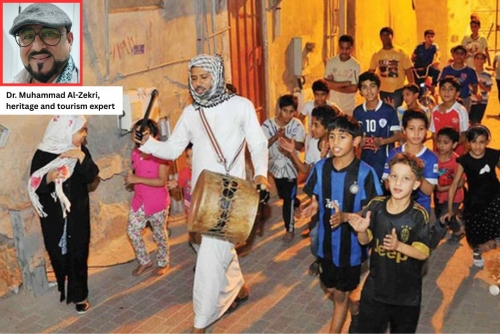Al-Musaharati: A Living Tradition of Ramadan in Muharraq
TDT | Manama
Email: mail@newsofbahrain.com
The Al-Musaharati, or the traditional Ramadan drummer, is far more than just a figure tied to the holy month in Bahrain’s Muharraq.
It represents a deep-rooted aspect of Islamic heritage that has survived the test of time and modernization.
From its humble beginnings during the era of Prophet Muhammad (PBUH) with Bilal ibn Rabah calling for suhoor (predawn meal), to the development of the practice in Egypt during the Fatimid era, this tradition has evolved over centuries.
The practice, known for its unique rhythm and cultural significance, has reached its contemporary form, blending both tradition and modernity, especially in the Gulf region.
Makkah: The Birthplace of Suhoor Announcements
While the tradition of Al-Musaharati as we know it today developed in Egypt, its roots trace back to Makkah, the birthplace of many Islamic customs.
In the early days of Islam, people would climb Mount Abu Qubais, announcing the call for suhoor across the city.
The muezzins of Makkah would continue their Qur’anic recitations until the time for fasting arrived, marking the beginning of the fasting day.
In his travels, the famous Andalusian traveler Ibn Jubayr (1183) described a practice in Makkah where the “zamzami” muezzin would call for suhoor in a distinct style, similar to that of Al-Musaharati.
He would call out from his minaret, accompanied by two young boys who echoed his words: “Have suhoor, may Allah forgive you, for there is blessing in suhoor.”
This tradition remained strong throughout the centuries and continues to be celebrated in Makkah as part of its Ramadan heritage.
Geographically and culturally, Bahrain has always been closely tied to the broader Islamic world. As a key region in the Arabian Gulf, it absorbed many cultural and religious practices from Makkah and Medina.
This includes the practice of Al-Musaharati, which flourished in Bahrain, especially in Muharraq, where the musaharati walks the narrow streets at night, echoing the chants once heard in Makkah: “Wake up, eat suhoor, the blessed month of Ramadan is here.”
The practice in Bahrain, like its predecessors, is deeply embedded in local Ramadan rituals.
The musaharati’s rhythm, often accompanied by a drum, calls on communities to prepare for suhoor and marks the beginning of the most sacred part of Ramadan. While it has become less common in some places due to modern technology, Bahrain’s Muharraq continues to preserve this tradition, integrating it into the island’s Ramadan festivities.
As families in Bahrain strive to engage younger generations with the spirit of Ramadan, the traditional Ramadan drum has been reinvented for children.
These modernized drums, often adorned with beloved cartoon characters, serve as a bridge between the old and new.
Crafted from traditional materials like leather, they allow children to participate in the spirit of the month, keeping the cultural connection intact while appealing to younger sensibilities.
These children’s drums not only introduce the younger generation to the Ramadan customs but also enhance the festive atmosphere in homes and communities, encouraging kids to learn about their heritage through a fun, interactive experience.
Despite the rapid advancement of technology, the figure of the musaharati remains one of the most beautiful symbols of Ramadan in Bahrain.
More than just a traditional figure, the musaharati embodies the social cohesion and warmth of the holy month, fostering a sense of unity and communal spirit.
As heritage tourism in Bahrain grows, the musaharati is poised to play a key role in promoting the island’s cultural identity, offering tourists a unique glimpse into the timeless traditions of Ramadan.
The Ramadan atmosphere in Bahrain, especially in Muharraq, is special.
The musaharati wanders the narrow streets, calling out: “Oh sleeper, awaken to the name of Allah... Wake up for suhoor, Ramadan is here!”
In the past, the musaharati would address individuals by name, strengthening the bond between him and the community.
The enthusiasm of children who would join in the process, banging their smaller drums, added to the sense of excitement.
Families would reward the musaharati with money and gifts as a gesture of gratitude for his efforts during the holy month.
Today, despite the role of the musaharati having diminished in certain areas, it is still revived during Ramadan festivals and cultural events across Bahrain.
The figure of the musaharati can be found at heritage celebrations, in Ramadan gatherings, and even during tourism events where visitors can experience the rich traditions of Bahraini Ramadan.
As Bahrain’s tourism sector, particularly heritage tourism, continues to grow, the musaharati holds significant potential to enrich the tourist experience.
Tourists can now:
- Participate in heritage tours of Muharraq, where they can interact with the musaharati, listen to stories, and hear the chants that have echoed through the streets for centuries.
- Experience the musaharati’s role in Ramadan gatherings at hotels and cultural events, living the true essence of Bahraini Ramadan.
- Attend live musaharati performances at cultural centers and during Ramadan festivals, offering a unique, immersive experience for those looking to discover the traditional customs of Bahrain.
While the musaharati remains an iconic figure in Ramadan, maintaining the tradition requires financial and community support.
Historically, the musaharati’s payment was variable, based on the community’s wealth and needs.
In ancient times, his compensation was often provided in kind, with grain or produce.
Over time, wealthy families would give more substantial gifts, while the poor were exempted.
In Bahrain and the Gulf, the musaharati’s earnings traditionally came through gifts and tips during the Eid festivities.
However, in modern times, the decline in the practice due to technological advancements calls for new ways to support the musaharati, ensuring the tradition remains alive.
This can include integrating him into cultural and tourism events or establishing community initiatives to preserve this important piece of Bahrain’s Ramadan heritage.
(The views and opinions expressed in this article are those of the author and do not necessarily reflect the official policy or position of the Daily Tribune)
Related Posts

